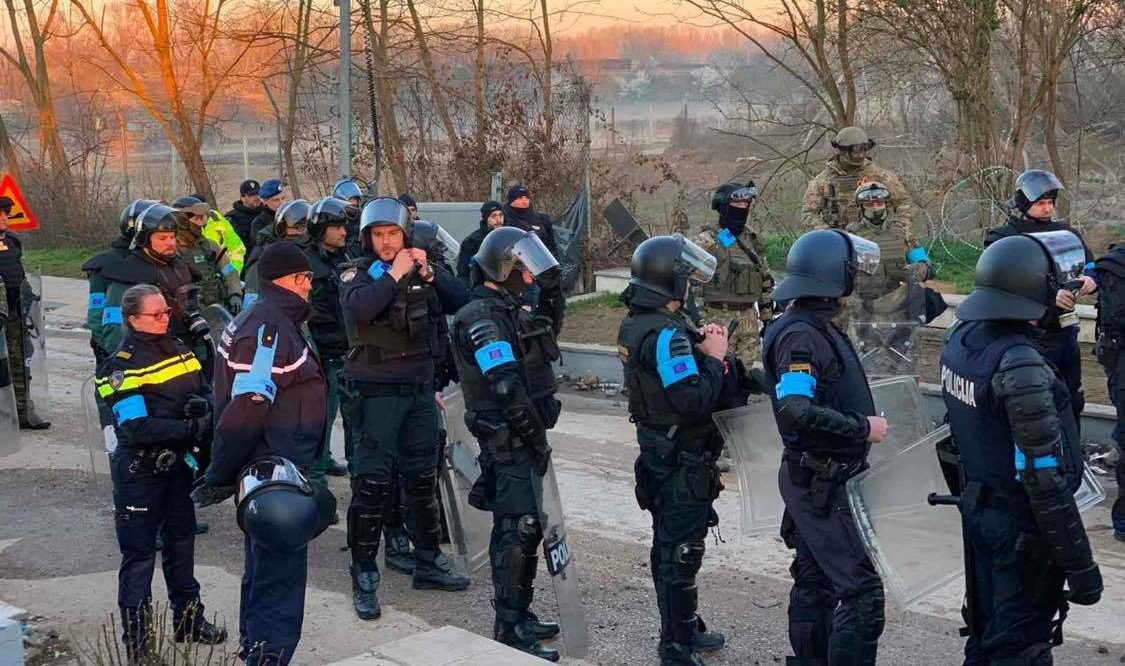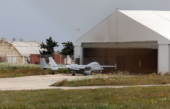In two RABIT missions, the EU Border Agency is sending 100 additional officials to the Greek-Turkish land and sea border. Frontex currently has around 600 operational forces stationed in Greece.
Frontex has started two new missions in Greece. Following a decision by Director Fabrice Leggeri, the EU Border Agency is sending border guards with technical assets to the Aegean Sea. A further mission has been launched today to reinforce police and military units for border surveillance on the land border with Turkey. This follows a request by the government in Athens.
Frontex is coordinating the new operations with EU Commission President Ursula von der Leyen, who visited the Greek-Turkish land border with the President of Parliament and the President of the Council on 3 March. Von der Leyen did not say a word about the one-month suspension of asylum applications imposed by Greece, nor did she comment on Greek attacks on refugees. Instead, she praised the government’s measures as a “European shield” and promised emergency financial aid of 700 million euros for “migration management”.
Frontex in Greece since 2010

The police officers do not come from the “Standing Corps”, which Frontex is establishing with 10,000 troops until 2027, following a decision last year. Instead, they will be deployed as part of the “Rapid Border Intervention Teams” (RABITs), which include 1,500 personnel. RABITs were first deployed in Greece ten years ago. Frontex promises that they can be ready for action within 10 days. From 2021 the RABITs will be transferred to the “Standing Corps”.
Since 2011, the Frontex operation in Greece is called “Joint Operation Poseidon”, which operates with up to 13 vessels in the Aegean Sea. Additionally, Frontex operates border control missions (“Joint Operation Focal Points Land”) in the region of the border river Evros.
At present, 27 EU Member States and Schengen associated countries have a total of 509 border officials stationed in Greece and have deployed ships, boats, aircraft, helicopters, emergency vehicles, buses and mobile thermal imaging units there. With the RABIT operations, Frontex is coordinating more than 600 operations at Greece’s land and sea borders.
“SurvivorR” from Austria

Frontex Director Leggeri decided on the nature and scope of the two new RABIT emergency operations. 108 officials were requested, the press release on the occasion of the start of the operations mentions 100. They are operating in their own vehicles and come from countries such as Poland, Italy, Spain, Austria, Slovenia and the Netherlands. Ten “Border Surveillance Officers” and one “Frontex Support Officer” will be deployed by the German Federal Police initially until 6 May, although it is unclear whether they will be deployed at missions on land or sea borders.
For the Greek-Turkish land border, Austria’s police brings a special car “SurvivorR” and two drones. In the Aegean, Frontex is sending a high sea patrol ship, six more coastal patrol ships, two helicopters, an aircraft and three vehicles with night vision systems.
Other activities in the region

The equipment comes from Frontex’s “Rapid Reaction Equipment Pool” and the general “Technical Equipment Pool”, in which German police authorities are also participating with three helicopters, one mission ship, two patrol boats, ten thermal imaging cameras, two vehicles and a mobile heartbeat detector. One of the German helicopters with a crew of eight is now being transferred to Samos. There, the German Federal Police have already been stationing their two patrol boats together with a 27-man crew from the “Technical Equipment Pool” since 2016.
Frontex is also deployed in Greece’s neighbouring countries. Among them are more than 60 officers who are monitoring the Albanian-Greek land border in their own vehicles during the first Frontex mission in a third country. Other officials from EU Member States are assisting Bulgarian authorities at the Bulgarian-Turkish border. They are deployed as part of Frontex’s “Flexible Operational Activities (FOA) Westbalkan”.
Image: Start of Frontex’s emergency operation at the Greek-Turkish land border on 13 March 2020 (Government Press Office in Athens).





Leave a Reply